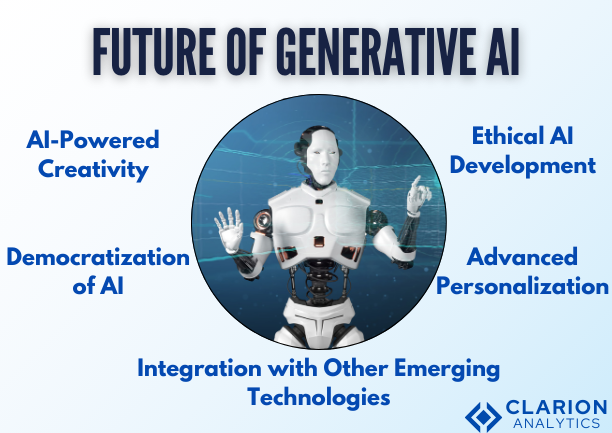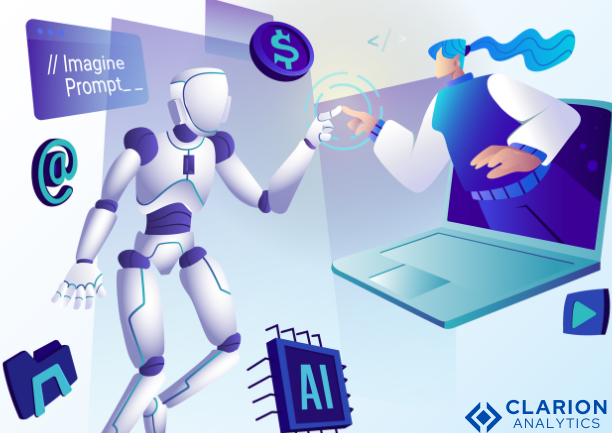
The technology of generative AI leads contemporary innovation efforts which transform industries everywhere throughout the world. Generative AI finds practical uses across healthcare industry and finance as well as manufacturing and entertainment application fields. The blog investigates how Generative AI transforms industry operations through enhanced productivity and creation capabilities that produce business expansion. The article examines the effects of this technology on the challenges it encounters alongside its future prospects.
Introduction to Generative AI
Algorithms under Generative AI learn existing data patterns to generate new expressions of content including visual components and audio files as well as written text. The model diverges from standard AI systems which concentrate on recognition or prediction since its purpose is to create fresh data which resembles the initial information pool. The distinct feature of Generative AI emerges from its capability to generate authentic new content.
Key Concepts in Generative AI
Generative AI relies on deep learning architecture because deep learning incorporates neural networks structured in multiple layers which allow data representation at progressively abstract levels.
The Generative Adversarial Networks (GANs) system brings together two neural networks to compete against each other for producing realistic data through their generator and discriminator components.
Transformers operating in natural language processing work to reform text generation through GPT (Generative Pre-trained Transformer) and similar models.
The Rise of Generative AI
The development of powerful computing resources and the availability of vast amounts of data have fueled the rise of Generative AI. Companies and researchers are continuously innovating, leading to breakthroughs in how AI can create and manipulate content.

Intrigued by the possibilities of AI? Let’s chat! We’d love to answer your questions and show you how AI can transform your industry. Contact Us
Impact of Generative AI on Various Industries
1. Healthcare
Healthcare experiences transformation through AI technology that improves diagnosis procedures alongside personalized medical regimens and speeds up the process of medical drug development.
AI in Diagnostics
Current technology utilizes AI algorithms to evaluate medical images such as X-rays and MRIs for detecting anomalies at higher accuracy levels than that of human radiologists. Generative AI technologies now detect initial indications of cancer before they become advanced so healthcare providers can provide prompt medical care.
Drug Discovery and Development
The traditional discovery of new drugs takes both an extended amount of time and produces high costs. Computational tools based on artificial intelligence model substances at a molecular scale to forecast their natural responses. The modeling of artificial intelligence enables the creation of new drug candidates and speeds up drug development processes without requiring additional market expense.
Personalized Medicine
A new generation of treatment strategies becomes possible through AI analysis of genetic data and individual health information and personal habits. Through AI-generated recommendations tools clinicians achieve better patient results together with reduced medication adverse effects.
2. Finance
In the financial industry, Generative AI is powering innovation in fraud detection, algorithmic trading, and customer support.
Fraud Detection
Generative AI models can process huge volumes of transaction data to identify patterns that suggest fraudulent activity. By creating synthetic data that looks like actual transactions, these models enhance their capability to detect and prevent fraud.
Algorithmic Trading
AI is being utilized to create advanced trading algorithms that are able to forecast market movements and trade at the best times. These AI models create scenarios using historical data, enabling traders to make well-informed decisions.
Improving Customer Experience
Banks and financial institutions are using AI to design customized financial products and services. AI-generated content, like customized investment strategies and financial recommendations, improves customer experience and instills confidence.
3. Manufacturing
The manufacturing sector undergoes fundamental changes through AI because it optimizes designs while boosting quality testing and allowing equipment performance prediction for maintenance activities.
Design Optimization
The manufacturing industry implements Generative AI to produce optimal designs of components alongside products. Overall AI operates through different design simulations to develop creative solutions which reduce material needs while boosting performance levels.
Quality Control
AI examines production data through algorithms which detect flaws during ongoing production. Manufacturers can identify quality problems early before quality issues spread by monitoring production data through this technology thus reducing product waste and increasing product reliability.
Predictive Maintenance
The predictive maintenance function of AI operates through machine sensor data evaluation to forecast equipment breakdowns. The production of maintenance schedules through analyzed data allows manufacturers to stop equipment failures before they occur and lengthen their operational duration.
4. Entertainment and Media
AI is transforming the entertainment sector by making it possible to produce personalized content, enhancing content creation, and increasing audience engagement.
Content Creation
AI is utilized to develop realistic virtual characters, produce music, and even script. AI-based tools such as deepfakes and voice synthesis are revolutionizing the way content is created, providing new avenues for creativity and innovation.
Personalization
Media companies and streaming platforms are utilizing Generative AI to tailor content suggestions. With the understanding of user preferences and behavior, AI can make suggestions for customized playlists, films, and beyond, making the viewing experience more enhanced.
Making Visual Effects Better
Generative AI is used in the movie and gaming industries to create exquisite visual effects and lifelike animation. Tools that are driven by AI can produce realistic texture, lighting, and motion, lessening production time and expenditure.
5. Retail
Generative AI transforms retail operations through improved customer satisfaction together with optimized inventory and targeted marketing capabilities.
Personalized Shopping Experiences
AI systems help retailers generate shopping situations that adapt to individual customer preferences. AI-based technology tools create product suggestions together with virtual dressing experiences and custom-made promotions through the analysis of client interests.
Inventory Management
The analysis of sales data by AI predictive models reveals anticipated market trends which enable retailers to determine better inventory quantities. Through accurate demand predictions AI helps retailers minimize running out of stock and having excess inventory with the result of better operational effectiveness and higher profitability.
Marketing and Advertising
Generative AI technologies revolutionize the marketing sector by allowing companies to develop specific advertisements and content solutions. Electronic ads alongside social media broadcasting and automated email messages generated by AI models boost consumer engagement as well as conversion numbers.
6. Automotive
The car industry is evolving with AI leading the charge in vehicle design, autonomous driving, and supply chain management.
Autonomous Driving
AI lies at the heart of autonomous driving technology. AI-based models are employed to create real-time driving scenarios, allowing self-driving vehicles to drive in complex environments. Through simulation of different driving conditions, AI contributes to enhancing the safety and reliability of autonomous vehicles.
Vehicle Design
Automakers are leveraging AI to design new vehicle models that maximize performance and efficiency. AI-based tools can create and analyze several design iterations, enabling engineers to choose the optimal one for production.
Supply Chain Optimization
AI is also being applied to optimize supply chain operations in the automotive sector. AI-based models can create demand forecasts, optimize logistics, and control inventory, ensuring a seamless and efficient supply chain.
7. Energy and Utilities
AI is also contributing significantly to the energy industry by streamlining energy generation, improving grid management, and facilitating predictive maintenance.
Streamlining Energy Generation
Generative AI is utilized to streamline energy generation from renewable resources such as solar and wind. AI-based models can make predictions about energy output based on weather conditions, allowing for better energy management.
Grid Management
Electricity companies are using AI to enhance grid management. AI tools can create real-time simulations of the grid, enabling grid operators to control demand, avoid outages, and maintain a stable power supply.
Predictive Maintenance in Utilities
In the utilities industry, AI is helping to forecast and avoid equipment failure. Through data from sensors and past maintenance activity, AI is able to create maintenance schedules that minimize downtime and prolong the life of critical assets.
Intrigued by the possibilities of AI? Let’s chat! We’d love to answer your questions and show you how AI can transform your industry. Contact Us
Challenges and Ethical Considerations in Generative AI
Though Generative AI has massive potential, it presents several challenges and ethical issues that have to be resolved.
Data Privacy and Security
AI models need enormous data to produce realistic content. This creates data privacy and security concerns since sensitive data could be inadvertently utilized or leaked while training the models.
Bias and Fairness
AI systems have the unintended ability to learn and mirror biases in the training data. This can result in discriminatory or unfair outcomes, especially in applications such as hiring, lending, and law enforcement. It is essential to address bias in AI in order to maintain fairness and equity.
Intellectual Property and Ownership
AI obfuscates intellectual property and ownership, particularly in creative industries. Who owns the content that AI produces – the creator of the AI, the user who feeds the data, or the AI itself?
Ethical Use of AI-Generated Content
The application of AI-generated content, including deepfakes, is ethically challenging. Deepfakes may be applied for entertainment or artistic use, but they can also be exploited for malicious use in disseminating false information or invading privacy.
Transparency and Explainability
With increasing complexity of AI models, comprehending how they produce content is increasingly difficult. Transparency and explainability in AI decision-making is crucial, especially in sectors such as healthcare and finance.
The Future of Generative AI

The future of Generative AI is filled with exciting possibilities. As the technology continues to evolve, we can expect to see even more innovative applications across various industries.
Advanced Personalization
Industrial sectors including retail and finance together with entertainment will achieve higher levels of personalization through AI capabilities. Through AI-driven modeling techniques organizations can produce highly unique product experiences that specifically address individual consumer needs.
Integration with Other Emerging Technologies
Various emerging technologies continue to integrate with AI and the Internet of Things (IoT) and blockchain as well as augmented reality (AR). The combined systems will enable creative answers to complex problems which multiple industries face.
Ethical AI Development
The expansion of Generative AI usage will trigger an increasing attention to ethical AI development. Developing ethical AI means establishing rules to maintain AI use that is both transparent and fair as well as responsible.
Democratization of AI
Businesses of various sizes will have expanded access to Generative AI tools and resources which will enable them to benefit from the technology. The increased accessibility of AI technologies will create business innovation and give smaller businesses a chance to compete against larger companies.
Conclusion
The emerging generative AI technology establishes new industries while fueling productive changes across all sectors. The applications of Generative AI span across healthcare and entertainment and cover manufacturing and finance industries among others. The continuous development of the technology requires immediate solutions to its emerging problems alongside ethical evaluation.
Also Read:
The impact of Generative AI is reshaping how intelligent systems are designed and adopted, beginning with strong foundations explained in Large Language Models 101: NLP Fundamentals for Smarter AI Solutions. This evolution is evident in How LLMs Have Changed UI and UX in Software Engineering, where natural language interfaces are transforming user interactions, and in AI in Manufacturing: Transforming the Future, where intelligent automation is driving operational efficiency. To ensure trust and transparency in these advanced systems, The Power of Explainable AI (XAI) in Deep Learning: Demystifying Decision-Making Processes highlights the importance of interpretability. Looking ahead, Agentic AI: Empowering Extraordinary Innovations showcases the rise of autonomous, goal-driven systems, while Digital Transformation and ESG: 101 emphasizes responsible and sustainable adoption of Generative AI across industries.
Intrigued by the possibilities of AI? Let’s chat! We’d love to answer your questions and show you how AI can transform your industry. Contact Us
